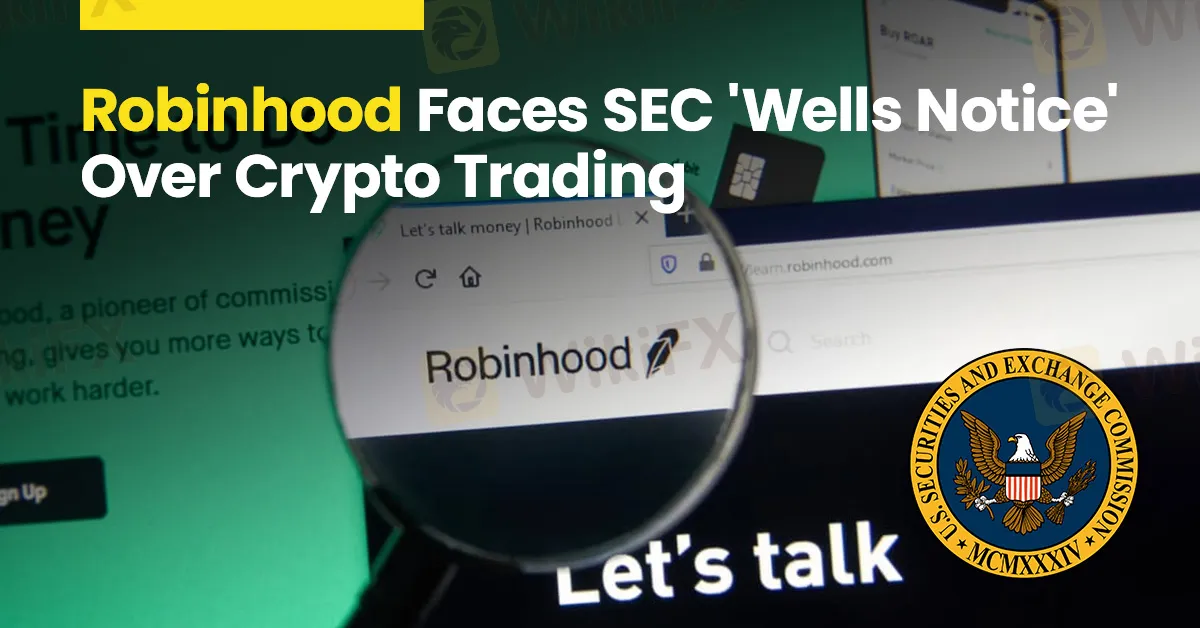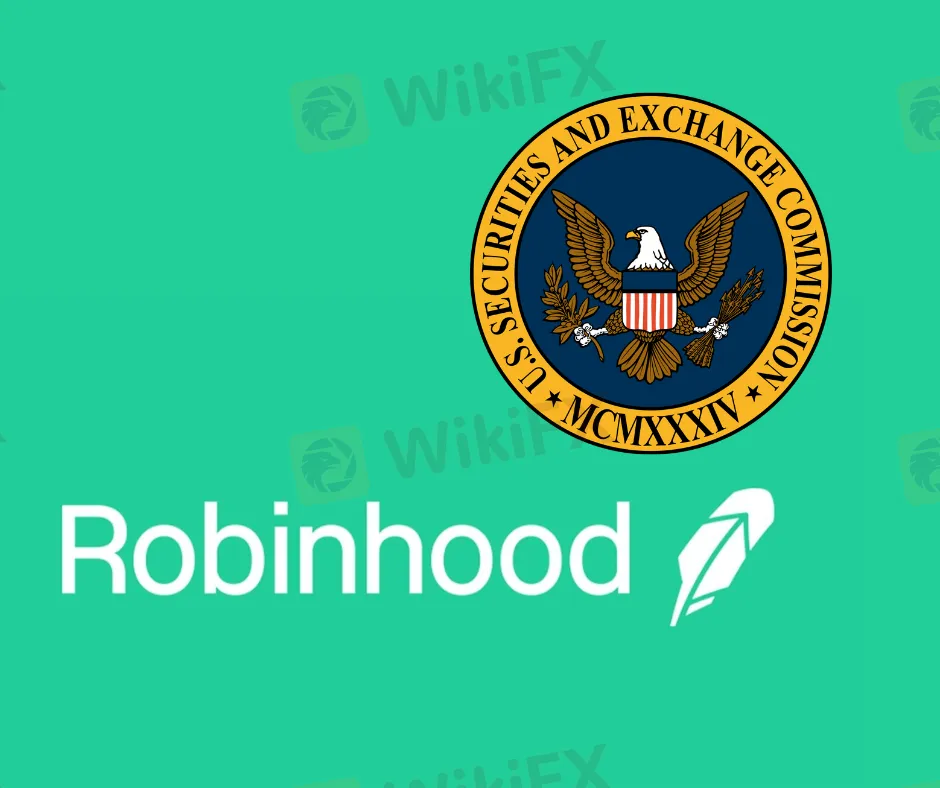简体中文
繁體中文
English
Pусский
日本語
ภาษาไทย
Tiếng Việt
Bahasa Indonesia
Español
हिन्दी
Filippiiniläinen
Français
Deutsch
Português
Türkçe
한국어
العربية
Robinhood Faces SEC 'Wells Notice' Over Crypto Trading
Abstract:Robinhood Markets made an announcement on Monday, revealing that it has been served with a "Wells notice" from the U.S. Securities and Exchange Commission (SEC), indicating a potential enforcement action related to its cryptocurrency trading operations.

Robinhood Markets made an announcement on Monday, revealing that it has been served with a “Wells notice” from the U.S. Securities and Exchange Commission (SEC), indicating a potential enforcement action related to its cryptocurrency trading operations. This notification, dated May 4, does not imply any wrongdoing on Robinhood's part but suggests that the SEC may be considering taking action.
A Wells notice is a procedural step by the SEC, signalling its staff's recommendation for enforcement action and providing the recipient with an opportunity to contest the proposed charges. This development follows similar warnings and legal actions taken by the SEC against prominent cryptocurrency exchanges like Uniswap, Coinbase, and Binance.

Robinhood has contested the SEC's stance, asserting that the cryptocurrencies offered on its platform are not securities. According to Dan Gallagher, Robinhood's Chief Legal, Compliance, and Corporate Affairs Officer, the company is confident that the assets listed on their platform do not constitute securities. They express eagerness to engage with the SEC to highlight the flaws in any potential case against Robinhood Crypto.
The SEC has consistently maintained that most crypto tokens are securities and should be subject to regulation accordingly. This position has led to disputes with several cryptocurrency companies, which have criticized the agency for exceeding its regulatory boundaries. The SEC has yet to issue a statement regarding this particular enforcement notice.
Robinhood CEO Vlad Tenev has expressed the company's readiness to defend its position through legal channels if necessary. In a message, Tenev stated that if required, they would utilize their resources to contest the matter in the courts.
This development reflects the ongoing tensions between the SEC and major cryptocurrency platforms, which argue that cryptocurrencies do not meet the traditional criteria for securities. Robinhood Crypto has been seeking SEC registration for almost two years to enhance its compliance measures.
The heightened regulatory scrutiny has drawn criticism from crypto-friendly lawmakers, such as House Majority Whip Tom Emmer (R-Minn.), who has accused the SEC of engaging in “regulation by intimidation.” Emmer has highlighted the SEC's unfavorable track record in court cases and accused Chair Gensler of using the threat of litigation to exert pressure on the crypto industry. Emmer and other lawmakers are scheduled to hold a hearing titled “SEC Enforcement: Balancing Deterrence with Due Process,” where cryptocurrency regulations will be a focal point.
Last month, Consensys filed a lawsuit against the SEC over its classification of ether, disclosing that it had received a Wells notice. The notice pertained to the scrutiny of Consensys' MetaMask Swaps and Staking products, alleging that Consensys had operated as an unregistered broker-dealer.

Disclaimer:
The views in this article only represent the author's personal views, and do not constitute investment advice on this platform. This platform does not guarantee the accuracy, completeness and timeliness of the information in the article, and will not be liable for any loss caused by the use of or reliance on the information in the article.
Read more

Why More People Are Trading Online Today?
Discover why online trading is booming with tech, AI, and a push for financial freedom. From stocks to crypto, it’s a thrilling hustle for all.

SEC Ends Crypto.com Probe, No Action Taken by Regulator
The SEC has closed its investigation into Crypto.com with no action taken. Crypto.com celebrates regulatory clarity and renewed momentum for the crypto industry.

Interactive Brokers Expands Crypto Trading with Solana, XRP, Cardano, and Dogecoin
Interactive Brokers adds Solana, XRP, Cardano, and Dogecoin to its platform, enabling U.S. and U.K. clients to trade crypto 24/7 with low fees.

Fidelity Investments Explores Stablecoin Innovation in Digital Assets Sector
Fidelity Investments tests a stablecoin, joining major financial firms in the booming crypto sector. Discover how this impacts digital payments and blockchain adoption.
WikiFX Broker
Latest News
Why Are Financial Firms Adopting Stablecoins to Enhance Services and Stability?
Experienced Forex Traders Usually Do This Before Making a Lot of Money
Octa vs XM:Face-Off: A Detailed Comparison
When High Returns Go Wrong: How a Finance Manager Lost RM364,000
Bridging Trust, Exploring Best—WikiEXPO Hong Kong 2025 Wraps Up Spectacularly
Interactive Brokers Expands Crypto Trading with Solana, XRP, Cardano, and Dogecoin
Fidelity Investments Explores Stablecoin Innovation in Digital Assets Sector
Why More People Are Trading Online Today?
SEC Ends Crypto.com Probe, No Action Taken by Regulator
Broker Comparison: FXTM vs XM
Currency Calculator







